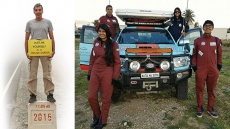Last year's Father's Day snuck up quickly on Raywat Deonandan, coming five weeks after the birth of his first child Harrison, and three months into a global pandemic.
While Canada's first wave of COVID-19 had started to recede by June 2020, experts like Deonandan, an epidemiologist with the University of Ottawa, were still learning about the new virus then.
A year later, with several effective vaccines available, Canada's COVID-19 burden has been substantially alleviated, opening opportunities for families to enjoy this Father's Day in safer ways than holidays before.
Risk is still there for anyone who gathers, and public health measures shouldn't be tossed aside, Deonandan said. But he's hopeful this will be one of Canada's last holidays under a COVID-19 cloud.
"Maybe I should take note of the fact that this will be the end of my pandemic Father's Days and celebrate in some strange way," he said with a laugh.
Deonandan isn't sure yet how he'll commemorate Sunday, but it won't involve visiting his 80-year-old father in Toronto — a lengthy drive for a one-day trip.
He said families living in closer proximity should be able to safely see their dads this weekend however, with some caveats.
The vaccination status of patriarchs and their progeny will impact risk, he said, as will the level of COVID-19 circulating in the community.
Regions with recent outbreaks, including Ontario's Waterloo health unit, should be more cautious regardless of their inoculation levels, Deonandan said, likening vaccine protection to wearing rainboots in a flood.
"If the floodwaters are high enough, they get over the lip of your boots and they get your feet wet," he said. "So as long as the disease presence isn't above a certain level, the vaccines will protect most people."
Canada's average daily case count has dropped almost 85 per cent and hospitalizations have decreased by 60 per cent from the peak of the third wave, chief medical officer Dr. Theresa Tam said this week.
Dr. Sumon Chakrabarti, an infectious disease specialist in Mississauga, Ont., said that while Father's Day gatherings will carry some risk, low case counts and high vaccine uptake means family events are safer now than they were just weeks ago.
Chakrabarti, who has daughters aged 2 and 3, is hosting his London, Ont.-parents this Sunday while following public health measures. It will be the first time his daughters see their grandparents since August.
"Family, friends, they're so important for mental health, for kids' development, and that was taken away from us the past year," Chakrabarti said. "So bringing that back into life, it shows things are getting better and we have a lot to look forward to."
While young children who aren't vaccinated can pose a risk to grandparents, danger is lessened when community spread is low, Chakrabarti said. Risk can be decreased further with distancing, masking or keeping the gathering outdoors.
Deonandan said it's better to have distanced visits between children and their grandparents, but hugs can be safe with masks.
"Just no wet kisses," he added.
Deonandan warned not to consider fully-vaccinated grandfathers "bulletproof," however, especially in COVID-19 hot spots where children could be asymptomatic carriers.
"The probability (of spread) is low. Vaccines offer good protection ... but do you really want to roll that dice?"
Nearly 75 per cent of Canadians aged 12 and up had received at least one dose of a vaccine as of Tuesday, with 16 per cent of the eligible population fully vaccinated.
That means Father's Day gatherings could include a smattering of fully, partially or non-vaccinated participants, which Chakrabarti said can dictate how safe an event will be.
"If the majority of the group is unvaccinated, keep it small and outdoors or stick to your own household," he said. "But if more people in the group have one or two doses, the risk is not zero but it's incrementally reduced."
Dr. Ilan Schwartz, an infectious disease expert with the University of Alberta, said people will have to do their own "risk calculus" before popping in on Papa, adding the benefit of being together may outweigh the danger for some families.
Even a single dose of a two-dose vaccine offers good protection, especially against severe disease and death, Schwartz said. But circulation of the more transmissible Delta variant could complicate things.
Recent data from the United Kingdom suggests the vaccines work well in staving off severe infection caused by the new variant, but a complete two-dose series is better than one shot.
Schwartz said what we know about Delta cases is concerning, but it's "not necessarily reason to panic." That could change if more outbreaks arise.
Schwartz celebrated Father's Day last weekend because his wife, a respiratory therapist who travels between Edmonton and Winnipeg, was home.
He had breakfast in bed alongside his 7- and 4-year-olds, but he couldn't visit his own father who lives in Manitoba.
"I haven't seen my parents in 17 months," he said. "But we're looking forward to a family reunion at the end of the summer when all the adults are fully vaccinated."
Photo courtesy of Istock.






